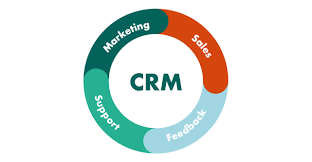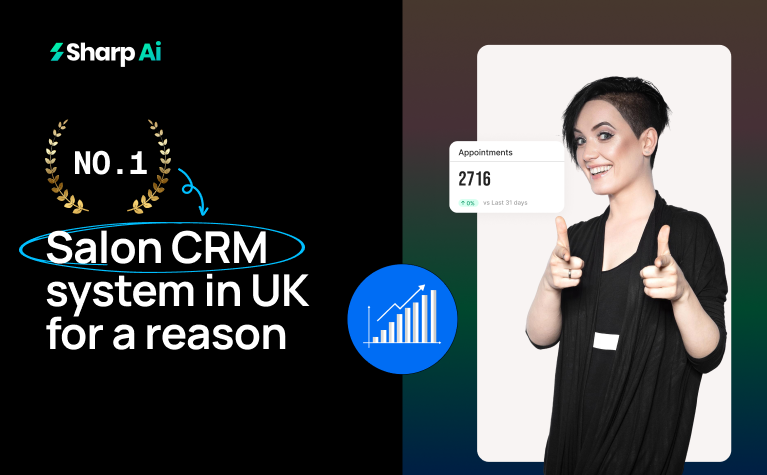If you think simple CRM implementation is going to help you make millions, you’re in for a ride. This blog by Sharp AI helps you understand why your business doesn’t just need CRM software implementation; it needs a proper CRM strategy. From different types of CRM strategies to a guide explaining in 10 steps how you can find a CRM strategy for your business. At the end of the blog, you will find the best CRM for your business and answers to some of the important CRM strategy-related FAQs.
There is a solid 83% chance that your sales goals will exceed if you implement CRM. Cool, isn’t it? But do you think merely installing the software and transferring your data is going to help your business become an empire? Frankly, no. A; you need AI-powered CRM (like Sharp AI) that can keep up with the advancements rolling in every hour. B; you need a rock-solid CRM strategy to ensure that your streamlined workflow and business operations actually brings results.
Read the blog to make your own CRM strategy right now, but first, let’s discuss the basics.
What is CRM?
Even in 2025, 22% of sales professionals are not familiar with defining what a CRM is and how it works. An AI-Powered CRM Software is far more than an electronic address book. It manages customer information, monitors sales, and simplifies your team’s workflow. Leverage AI Integration in CRM to automate follow-ups and unify communications to save time and minimize mistakes. For you, this translates to better relationships with customers, closed deals, and less hands-on effort. Whether you’re a start-up or an enterprise, a CRM is essential for personalizing customer experiences, driving sales, and scaling efficiently.
What is a CRM strategy?
Think of CRM strategy as the blueprint of your business success. CRM isn’t just a tool that you use to streamline business operations, it is a powerhouse in itself that can turbo surge your business towards success. A well-crafted CRM strategy is your roadmap to success. It guides your teams in leveraging software, processes, and data to engage prospects, convert leads, and nurture loyal clients.
With a solid strategy in place, your organisation sails smoothly. No more working in silos or navigating blind. Armed with reliable data, teams make informed decisions. One unified platform becomes your beacon of truth. The outcome? Enhanced collaboration, accelerated sales cycles, and delighted customers at every turn.
CRM Guide: Questions to Ask When Choosing the Right Software
What are the different types of CRM strategies?
A few types of CRM strategies include:
- Operational CRM strategy
- Analytical CRM strategy
- Collaborative CRM strategy
- Strategic CRM
- Campaign Management CRM strategy
- Customer Service CRM strategy
- Sales CRM strategy
5 Reasons to Create CRM Strategy
1. Because Guesswork Doesn’t Scale
Operating on gut feeling is okay for a while, but as touchpoints and customers increase, so do the missed opportunities. A CRM strategy exchanges hunches for data-driven clarity.
2. Your Customers Expect VIP Treatment
No customer likes to feel like “just another lead.” A CRM strategy enables you to treat each customer like a repeat VIP—remembering preferences, anticipating needs, and establishing trust.
3. Each Missed Follow-Up Costs You Money
Salespeople who follow up within an hour are 7x more likely to qualify a lead, studies show. A CRM strategy prevents those precious touchpoints from falling through the cracks.
4. Happy Teams Mean Happy Customers
Internal chaos is converted into collaboration when sales, marketing, and service teams align. A CRM strategy makes customers notice the difference on the other end right away.
5.Growth is Inevitable Without It—But Only for Your Competitors
Companies with a clear CRM strategy grow revenue 29% faster. If you’re not leveraging one, chances are your competitors are—and they’re pulling ahead while you play catch-up.
10 Steps To Creating A Successful CRM Strategy
Step 1: Establish Your CRM Strategy Objectives
Start with the end in mind. Are you looking to cut your sales cycle, improve retention, or raise revenue per customer? Writing down quantifiable objectives zeroes in your CRM strategy and generates results.
Step 2: Define Your Target Buyer
Not everyone is a customer. Develop rich buyer personas by demographics, purchasing behaviors, and pain points. This makes your CRM speak to who really counts.
Step 3: Enrich Your Value Proposition
Your value proposition should respond, “Why us?” Tailor it to different customer segments, so new leads, repeat buys, and avid supporters hear language that resonates.
Step 4: Develop a Customer Journey Map (CJM)
Picture each phase of your customer’s journey—awareness through to post-sales support. Mapping reveals drop-off points and moments for delightful experiences that create lasting impressions.
Step 5: Determine Which Customer Data to Collect with CRM
The Best CRM All-in-One Software can hold mountains of data, but not all that glitters is gold. Capture data that will support your goals—lead origin, purchase history, support interactions, and engagement scores.
Step 6: Establish the KPIs of Your CRM Strategy
Choose KPIs that shine a light on the success of your strategy. Consider retention rate, Net Promoter Score (NPS), Customer Lifetime Value (CLV), and average deal size. Regular checking is critical.
Step 7: Coordinate Your Internal Processes
A CRM will not fix broken processes. Establish how your teams receive leads, work on opportunities, and pass customer info along. Strong internal processes render CRM insight power tools.
Step 8: Select the Ideal CRM Software
Select software only after having your plan in place. Look for an All-in-One Sales Platform that is complete integration with existing systems, easy to use, and automatable. Scalability also counts.
Step 9: Get Your Team Onboard to CRM Strategy
Implementation by the team is most crucial for the success of CRM. Train your team, make the system relevant, and offer continuous assistance. Once they realize how an All-in-One CRM Software simplifies their job, use is rampant.
Step 10: Track and Enhance
A CRM strategy is a continuous process of improvement. Track your KPIs, receive feedback, and streamline processes on an ongoing basis. As your customers and business grow, your CRM strategy must do the same.
What does a CRM strategist do?
| Defining CRM Goals | Aligning the CRM strategy with business objectives such as revenue growth, retention, or customer satisfaction. |
| Mapping the Customer Journey | Understanding how customers interact with the business and shaping CRM processes around those touchpoints. |
| Data Strategy | Deciding what customer data to collect, how to segment it, and how to use it for personalisation and insights. |
| Technology Selection | Recommending and implementing the right CRM tools that fit the company’s size, industry, and goals. |
| Process Design | Standardising workflows across sales, marketing, and support to ensure smooth operations inside the CRM. |
| Team Enablement | Training employees, driving adoption, and ensuring the team understands the “why” behind the CRM strategy. |
| Performance Tracking | Defining KPIs and continuously monitoring CRM data to refine strategies and improve outcomes. |
Integrating Your Business with Sharp AI CRM
Now that you are quite confident about your CRM strategy, let us find the best software for your business. Sharp AI CRM, a benchmark of excellence in the saturated and competitive UK market, has been helping SMEs and large corporations with their day-to-day tasks and also focuses on strategic growth by providing a plethora of features notably Payments + Booking Management. Reduce costs of using separate tools, and have less client no-shows.
Sharp AI also brings its AI Employee Plan where you save 24% on total price and get the benefits of CRM+AI Agent. If you’re looking for the best CRM for your business, the search has come to an end because Sharp AI is your answer! Book a demo right away and enjoy the perks!
Winner or Wannabe? These 9 CRM Implementation Steps Show What You Are!
FAQ’s
-
What is a CRM strategy?
A CRM strategy is your guide for cultivating customer relationships. It’s a masterfully choreographed plan that combines tools, processes, and information. This combination supercharges experiences and drives business growth.
-
Why is having a CRM strategy necessary?
Without strategy, CRM software becomes a data graveyard. A good plan aligns your system with key objectives: retention, sales growth, and customer satisfaction.
-
How is CRM software different from CRM strategy?
Consider CRM software to be the tool; the CRM strategy is the master plan. The strategy illustrates the way this tool addresses business goals and customers’ needs.
-
Who would make a CRM strategy?
Usually, a CRM strategist or marketing manager takes the lead. They work alongside senior leaders and pick up advice from sales, marketing, and support teams.
-
What is the time taken to execute a CRM strategy?
Time taken for implementation differs—small companies might take weeks. Large organizations, on the other hand, might take a couple of months to implement and start running.
-
What measures the success of a CRM strategy?
It is measured through the monitoring of key performance indicators (KPIs). These are customer retention, sales cycle duration, Customer Lifetime Value (CLV), and Net Promoter Score (NPS).
-
Can small companies take advantage of a CRM strategy?
Yes! A CRM strategy enables small companies to build more effective relationships and compete on a more even level with larger firms.




